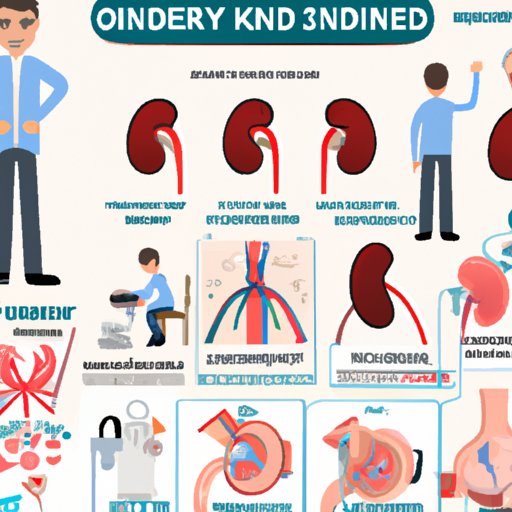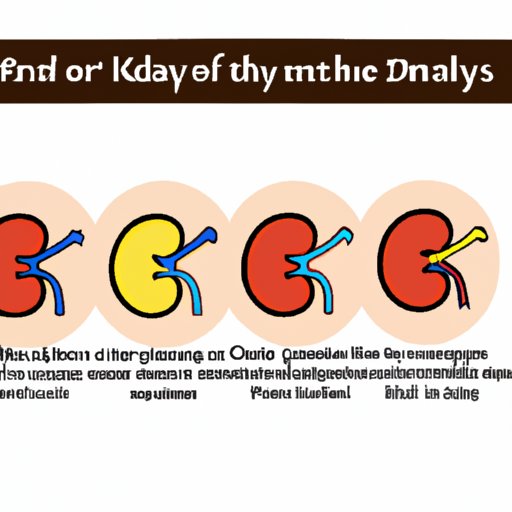
Introduction
Kidney disease is becoming increasingly prevalent, affecting millions of people worldwide. Understanding the different stages of kidney disease is crucial for individuals to manage the condition and improve their quality of life. This article will provide a comprehensive guide to understanding the different stages of kidney disease, exploring symptoms, treatment options, and prevention tips.
A Comprehensive Guide to Understanding the Different Stages of Kidney Disease
Kidney disease is a medical condition that affects the kidney’s ability to filter waste products from the blood, leading to the accumulation of toxins in the body. The condition can deteriorate over time, leading to complications such as high blood pressure, anemia, and bone disease. Kidney disease is divided into several stages. The early stages usually have no symptoms, and individuals may not even know they have the condition. The later stages of kidney disease can cause severe symptoms, leading to significant complications. Understanding the different stages of kidney disease is essential for managing the condition and improving the quality of life.

Exploring the 5 Stages of Kidney Disease and How to Manage Them
Kidney disease is divided into five stages based on the level of kidney function:
- Stage 1: Kidney damage with normal or increased GFR (glomerular filtration rate)
- Stage 2: Kidney damage and mildly decreased GFR
- Stage 3: Moderately decreased GFR
- Stage 4: Severely decreased GFR
- Stage 5: Kidney failure
The stages of kidney disease are determined by the glomerular filtration rate (GFR), which measures how well the kidneys are filtering waste products from the blood. A GFR of less than 60 milliliters per minute indicates kidney disease. In the early stages of kidney disease, there are usually no symptoms, and the condition can only be detected with a blood or urine test. As the condition progresses, symptoms such as fatigue, edema, and nausea may develop.
Managing kidney disease involves slowing the progression of the condition and managing symptoms. In the early stages of the disease, lifestyle changes such as maintaining a healthy diet, exercising, and quitting smoking can help slow the progression of the condition. In later stages, medications may be prescribed to control blood pressure and treat anemia. In severe cases, kidney transplantation or dialysis may be required.
The Importance of Identifying and Treating the Early Stages of Kidney Disease
Early detection of kidney disease is crucial for successful treatment. Early stage kidney disease may be treated with lifestyle modifications such as quitting smoking, maintaining a healthy diet, and managing blood pressure and blood sugar levels. Treating early stage kidney disease may slow the progression of the condition and prevent significant complications such as kidney failure.
A Look Into the Stages of Kidney Failure and Its Impact on Your Life
Kidney failure is the final stage of kidney disease, indicating that the kidneys are functioning at less than 15% of normal capacity. Kidney failure can lead to several complications such as fluid overload, anemia, and bone disease. Treatment options for kidney failure include kidney transplantation or dialysis. Dialysis is a medical procedure that filters waste products from the blood and is the most common form of treatment for kidney failure. Individuals with kidney failure require ongoing medical care to manage their symptoms and prevent complications.
Understanding the Different Stages of Chronic Kidney Disease and How to Prevent Progression
Chronic kidney disease (CKD) is a long-term condition that results in the progressive loss of kidney function over time. There are five stages of CKD, ranging from mild damage to the kidneys to complete kidney failure. Preventing progression of CKD involves managing underlying medical conditions such as high blood pressure and diabetes, maintaining a healthy diet, quitting smoking, and managing blood sugar levels. Individuals with CKD should also undergo regular monitoring to ensure early detection and treatment of complications.
Navigating the 6 Stages of Kidney Disease: What You Need to Know
Six stages of kidney disease are often used to categorize the condition, with stage 3 being divided into two subcategories:
- Stage 1: Kidney damage with normal or increased GFR
- Stage 2: Kidney damage and mildly decreased GFR
- Stage 3a: Moderately decreased GFR (45-59 ml/min)
- Stage 3b: Moderately decreased GFR (30-44 ml/min)
- Stage 4: Severely decreased GFR (15-29 ml/min)
- Stage 5: Kidney failure (GFR less than 15 ml/min)
Monitoring kidney function throughout all stages of the disease is crucial for successful management. Individuals should also work closely with their healthcare provider to develop a personalized treatment plan that addresses their unique medical history and symptoms.
The Relationship Between Kidney Function and Stages of Kidney Disease
Kidney function is closely related to the stages of kidney disease. Kidney function is measured by the GFR, which reflects how well the kidneys are filtering waste products from the blood. Decreased kidney function is a sign of kidney disease. Regular monitoring of kidney function is essential for early detection and treatment of kidney disease and its complications.
Maintaining good kidney function involves managing underlying medical conditions such as high blood pressure and diabetes, maintaining a healthy diet, and avoiding smoking and excessive alcohol consumption. Taking these steps can help prevent the development of kidney disease and slow the progression of the condition in individuals with existing kidney disease.
Conclusion
In conclusion, kidney disease affects millions of people worldwide and understanding the different stages of the condition is crucial for managing symptoms and preventing complications. The early stages of kidney disease may not have any symptoms, highlighting the importance of regular monitoring and early detection. Lifestyle modifications such as maintaining a healthy diet and managing blood pressure and blood sugar levels are key to slowing the progression of the condition. Finally, individuals with kidney disease should work closely with their healthcare provider to develop a personalized treatment plan that addresses their unique medical history and symptoms.




